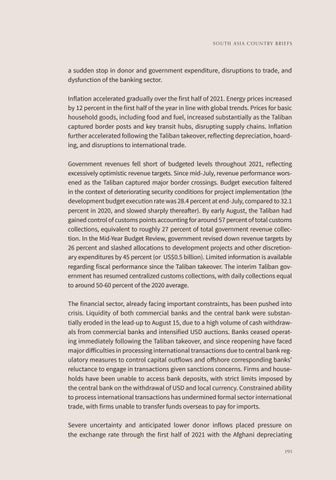S o u t h A s ia c o u n t r y b r i e f s
a sudden stop in donor and government expenditure, disruptions to trade, and dysfunction of the banking sector. Inflation accelerated gradually over the first half of 2021. Energy prices increased by 12 percent in the first half of the year in line with global trends. Prices for basic household goods, including food and fuel, increased substantially as the Taliban captured border posts and key transit hubs, disrupting supply chains. Inflation further accelerated following the Taliban takeover, reflecting depreciation, hoarding, and disruptions to international trade. Government revenues fell short of budgeted levels throughout 2021, reflecting excessively optimistic revenue targets. Since mid-July, revenue performance worsened as the Taliban captured major border crossings. Budget execution faltered in the context of deteriorating security conditions for project implementation (the development budget execution rate was 28.4 percent at end-July, compared to 32.1 percent in 2020, and slowed sharply thereafter). By early August, the Taliban had gained control of customs points accounting for around 57 percent of total customs collections, equivalent to roughly 27 percent of total government revenue collection. In the Mid-Year Budget Review, government revised down revenue targets by 26 percent and slashed allocations to development projects and other discretionary expenditures by 45 percent (or US$0.5 billion). Limited information is available regarding fiscal performance since the Taliban takeover. The interim Taliban government has resumed centralized customs collections, with daily collections equal to around 50-60 percent of the 2020 average. The financial sector, already facing important constraints, has been pushed into crisis. Liquidity of both commercial banks and the central bank were substantially eroded in the lead-up to August 15, due to a high volume of cash withdrawals from commercial banks and intensified USD auctions. Banks ceased operating immediately following the Taliban takeover, and since reopening have faced major difficulties in processing international transactions due to central bank regulatory measures to control capital outflows and offshore corresponding banks’ reluctance to engage in transactions given sanctions concerns. Firms and households have been unable to access bank deposits, with strict limits imposed by the central bank on the withdrawal of USD and local currency. Constrained ability to process international transactions has undermined formal sector international trade, with firms unable to transfer funds overseas to pay for imports. Severe uncertainty and anticipated lower donor inflows placed pressure on the exchange rate through the first half of 2021 with the Afghani depreciating 191




